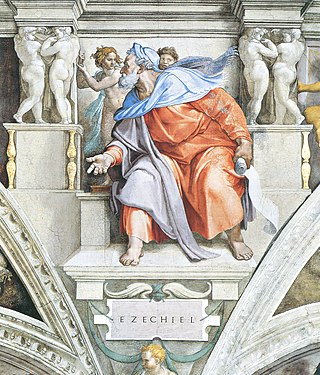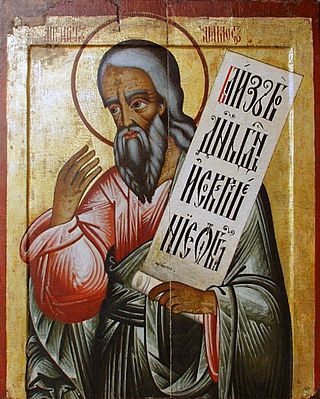The Book of Ezekiel is the third of the Latter Prophets in the Tanakh and one of the major prophetic books, following Isaiah and Jeremiah. According to the book itself, it records six visions of the prophet Ezekiel, exiled in Babylon, during the 22 years from 593 to 571 BCE, although it is the product of a long and complex history and does not necessarily preserve the very words of the prophet.
The Book of Zechariah, attributed to the Hebrew prophet Zechariah, is included in the Twelve Minor Prophets in the Hebrew Bible.

Ezekiel or Ezechiel is the central protagonist of the Book of Ezekiel in the Hebrew Bible.
The Old Testament (OT) is the first division of the Christian biblical canon, which is based primarily upon the 24 books of the Hebrew Bible or Tanakh, a collection of ancient religious Hebrew and occasionally Aramaic writings by the Israelites. The second division of Christian Bibles is the New Testament, written in the Koine Greek language.

In religion, a prophet or prophetess is an individual who is regarded as being in contact with a divine being and is said to speak on behalf of that being, serving as an intermediary with humanity by delivering messages or teachings from the supernatural source to other people. The message that the prophet conveys is called a prophecy.
The Nevi'im is the second major division of the Hebrew Bible, lying between the Torah ("instruction") and Ketuvim ("writings"). The Nevi'im are divided into two groups. The Former Prophets consists of the narrative books of Joshua, Judges, Samuel and Kings; while the Latter Prophets include the books of Isaiah, Jeremiah, Ezekiel, and the Twelve Minor Prophets.
The Minor Prophets or Twelve Prophets, occasionally Book of the Twelve, is a collection of prophetic books, written between about the 8th and 4th centuries BCE, which are in both the Jewish Tanakh and Christian Old Testament.

The major prophets is a grouping of books in the Christian Old Testament that does not occur in the Hebrew Bible. All of these books are traditionally regarded as authored by a prophet such as Jeremiah, Isaiah, Daniel, and Ezekiel. The term "major" has nothing to do with the achievement or importance of the prophets, rather with the length of the books. In comparison to the books of the Twelve Minor Prophets, whose books are short and grouped together into one single book in the Hebrew Bible, these books are much longer.
Apocalyptic literature is a genre of prophetical writing that developed in post-Exilic Jewish culture and was popular among millennialist early Christians. Apocalypse is a Greek word meaning "revelation", "an unveiling or unfolding of things not previously known and which could not be known apart from the unveiling".

In the Hebrew Bible and Christian Old Testament, Amos was one of the Twelve Minor Prophets. An older contemporary of Hosea and Isaiah, Amos was active c. 760–755 BCE during the rule of kings Jeroboam II of Israel and Uzziah of Judah. He was from the southern Kingdom of Judah but preached in the northern Kingdom of Israel. Amos wrote at a time of relative peace and prosperity but also of neglect of God's laws. He spoke against an increased disparity between the very wealthy and the very poor. His major themes of justice, God's omnipotence, and divine judgment became staples of prophecy. The Book of Amos is attributed to him.
According to Jewish tradition the Great Assembly was an assembly of 120 scribes, sages, and prophets, which existed from the early Second Temple period to the early Hellenistic period, roughly coinciding with the Persian hegemony over the nation of Israel. The assembly's members, known as Anshei Knesset HaGedolah, traditionally included such figures as Haggai, Zechariah, Malachi, Ezra, Nehemiah, Daniel, Hananiah, Mishael, Azariah, Mordechai and Zerubbabel.
Bible prophecy or biblical prophecy comprises the passages of the Bible that are claimed to reflect communications from God to humans through prophets. Jews and Christians usually consider the biblical prophets to have received revelations from God.
The prophetic books are a division of the Christian Bible, grouping 18 books or 17 books in the Old Testament. In terms of the Tanakh, it includes the Latter Prophets from the Nevi'im, with the addition of Lamentions and Daniel, both of which are included among the books of the Hebrew Ketuvim.

In Christianity, the figures widely recognised as prophets are those mentioned as such in the Old Testament and the New Testament. It is believed that prophets are chosen and called by God. This article lists such prophets. The first list below consists of only those individuals that have been clearly defined as prophets, either by explicit statement or strong contextual implication, along with the biblical reference to their office. The second list consists of those individuals who are recorded as having had a visionary or prophetic experience, but without a history of any major or consistent prophetic calling. The third list consists of unnamed prophets. The fourth list contains the names of those described in the Bible as prophets, but who are presented as either misusing this gift or as fraudulent. The final list consists of post-biblical individuals regarded as prophets and of post-biblical individuals who are claimed to have had visionary or prophetic experience.
There is much disagreement within biblical scholarship today over the authorship of the Bible. The majority of scholars believe that most of the books of the Bible are the work of multiple authors and that all have been edited to produce the works known today. The following article outlines the conclusions of the majority of contemporary scholars, along with the traditional views, both Jewish and Christian.
The Old Testament is the first section of the two-part Christian biblical canon; the second section is the New Testament. The Old Testament includes the books of the Hebrew Bible (Tanakh) or protocanon, and in various Christian denominations also includes deuterocanonical books. Orthodox Christians, Catholics and Protestants use different canons, which differ with respect to the texts that are included in the Old Testament.
There is no scholarly consensus as to when the Hebrew Bible canon was fixed. Some scholars argue that it was fixed by the Hasmonean dynasty, while others argue it was not fixed until the second century CE or even later.
According to the Talmud, there were 48 prophets and 7 prophetesses of Judaism. The last Jewish prophet is believed to have been Malachi. In Jewish tradition it is believed that the period of prophecy, called Nevuah, ended with Haggai, Zechariah, and Malachi at which time the "Shechinah departed from Israel".

Ezekiel 23 is the twenty-third chapter of the Book of Ezekiel in the Hebrew Bible or the Old Testament of the Christian Bible. This book contains the prophecies attributed to the prophet/priest Ezekiel, and is one of the Books of the Prophets. This chapter forms part of a series of "predictions regarding the fall of Jerusalem", and is written in the form of a message delivered by God to Ezekiel. It presents an extended metaphor in which Samaria and Jerusalem are compared to sisters named Oholah (Samaria) and Oholibah (Jerusalem), who are the wives of God and accused of "playing the whore" in Egypt then cuckolding her husband while he watched.

Ezekiel 25 is the twenty-fifth chapter of the Book of Ezekiel in the Hebrew Bible or the Old Testament of the Christian Bible. This book contains the prophecies attributed to the prophet/priest Ezekiel, and is one of the Books of the Prophets. This chapter contains the oracles against four nations: Ammon, Moab, Edom, and Philistia. The prophecies of God's vengeance against these and other foreign nations are recorded in other books of the prophets such as Isaiah, Jeremiah and Amos.






